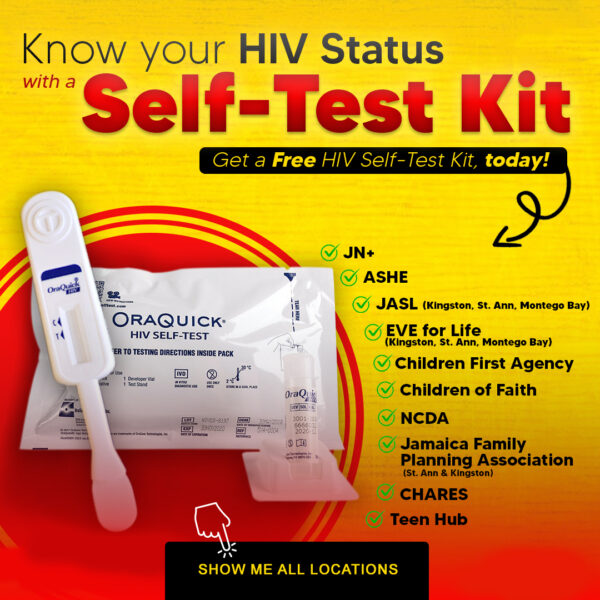Sexually Transmitted Infections (STIs) are infections passed on from one person to the next through sexual intercourse or sexual activities. These infections are transmitted through vaginal, anal and oral sex, and sometimes skin-to-skin contact. HIV is a STI. Other STIs include Chlamydia, Gonnorhea and Herpes, among others.
The Good, the Bad, and the Weird
HIV: What is it?
A virus that weakens the immune system and eventually causes AIDS if left untreated.
What are the symptoms?
Many people who are infected with HIV do not have any symptoms and feel healthy. Symptoms don’t usually develop until a person’s immune system has been weakened. The symptoms people experience are usually flu-like symptoms, or other symptoms related to infections and cancers they get due to a weakened immune system.
How do you get it?
Through unprotected vaginal, anal or oral sex. It can also be transmitted by sharing contaminated needles, from mother-to-child during birth or breast-feeding.
How is it treated?
There is no cure for HIV, but antiretroviral treatment can slow the progression of HIV and people on treatment can live long and healthy lives. Early diagnosis and treatment are key. Sticking to treatment can lead to viral suppression, which is when the viral load is so low that it is undetectable and untransmitable.
What happens if it isn't treated?
Increased risk for other life-threatening infections and certain cancers. By weakening the body’s ability to fight diseases, HIV makes an infected person more vulnerable to infections that they wouldn’t otherwise get. HIV can also cause infections that anyone can get, such as other STIs and pneumonia. Left untreated, HIV infection develops into AIDS and is fatal.
Chlamydia: What is it?
A bacterial infection of the genitals, anus, or throat.
What are the symptoms?
Most people who are infected have no symptoms. For women who do experience symptoms, they may have:
- Vaginal discharge that is discolored or yellow-green
- Vaginal bleeding
- Burning and pain during urination.
For men who do experience symptoms, they may have:
- Discharge or pain during urination
- Burning or itching around the opening of the penis.
Infection in the rectum can cause rectal pain, discharge, or bleeding in men and women.
How do you get it?
Through vaginal, oral, or anal sex. It can also be passed on from mother to child during childbirth.
How is it treated?
Antibiotics cure the infection. Your partner(s) should be tested (and treated, if necessary). To prevent passing the infection back and forth, you should avoid having sex until both you and your partner(s) are fully treated.
What happens if it isn't treated?
In women, chlamydia can cause pelvic inflammatory disease (PID), which can lead to infertility, tubal (ectopic) pregnancy, and chronic pelvic pain. Men may develop pain and swelling in the testicles, although this is rare. Chlamydia may also increase the chances of becoming infected with HIV, if a person is exposed. Babies born to infected women can develop eye or lung infections.
"Trich": What is it?
A parasitic infection of the genitals.
What are the symptoms?
Most people cannot tell they are infected because they have little to no symptoms. When there are symptoms, they include:
- Itching and inflammation of the genitals, especially during urination
- Pain during sex
- Discharge from the vagina or penis, which can be thin or frothy, with an unusual smell, and yellow or greenish in colour.
How do you get it?
Usually through unprotected vaginal sex (transmitted from a male to a female, or a female to a male, or a female to another female). It does not generally infect other body parts, like the mouth or anus.
How is it treated?
Antibiotics can cure the infection. It is important to take the entire dose of antibiotics as instructed, wait until all of your symptoms have gone go away and your treatment is done before you have sex again, and ensure that your sexual partner(s) gets treated too.
What happens if it isn't treated?
Trichomoniasis can increase risk for infection of other STIs, including HIV. In pregnant women, it may cause complications like early (preterm) delivery.
Gonorrhea: What is it?
A bacterial infection of the genitals, anus, or throat.
What are the symptoms?
Most people cannot tell they are infected because they have little to no symptoms. When there are symptoms, they include:
- A burning sensation while urinating
- Abnormal white, green, and/or yellowish vaginal or penile discharge
- Women may also have abnormal vaginal bleeding and/or pelvic pain
- Men may also have painful or swollen testicles.
How do you get it?
Through vaginal, oral, or anal sex. It can also be passed on from mother to child during childbirth.
How is it treated?
Gonorrhea can be cured with antibiotics. It is important to take the entire dose of antibiotics as instructed, wait until all of your symptoms have gone go away and your treatment is done before you have sex again, and ensure that your sexual partner(s) gets treated too. Drug-resistant strains of gonorrhea are increasing, and successful treatment of gonorrhea is becoming more difficult. If a person’s symptoms continue for more than a few days after receiving treatment, he or she should return to a health care provider to be reevaluated.
What happens if it isn't treated?
Gonorrhea can increase risk for infection of other STIs, including HIV. In women, untreated gonorrhea can cause pelvic inflammatory disease (PID), which can lead to infertility or ectopic pregnancy (when the fertilized egg implants outside the uterus, and the baby generally cannot survive). Men may develop epididymitis, a painful condition that can lead to infertility. Babies born to infected women can develop eye infections.
HPV: What is it?
A common viral infection with over 40 types that can infect the genitals, anus, or throat.
What are the symptoms?
Most people with HPV have no symptoms and do not develop health problems from it. However, some types of HPV can cause genital warts. Other types of HPV can cause cervical cancer and other less common cancers. Genital warts can appear within weeks or months of having sex with an infected partner. Genital warts consist of one or more bumps in and around the genital area (vagina, vulva, penis, testicles, and anus, etc.) that may be smooth or slightly bumpy to the touch and may resemble a cauliflower. In rare cases, HPV can cause warts in the throat. HPV-related cancers do not cause symptoms until the cancer is advanced—which is why regular screening for certain cancers, like cervical cancer, is so important.
How do you get it?
Through vaginal, oral, or anal sex. It can also be passed on during skin-to-skin sexual contact, and in rare cases, from mother to child during childbirth.
How is it treated?
HPV can be prevented through the use of vaccines. HPV vaccines are available for both males and females, and are the best way to protect against the types of HPV that cause most genital warts and HPV-related cancers.
There is no cure for HPV, but there are ways to treat HPV-related problems, like genital warts and cervical cancer. Genital warts can be removed, frozen off, or treated through topical medicines. Even after treatment, the virus can remain and cause the warts to come back.
Cervical cancer and other HPV-related cancers are most treatable when diagnosed and treated early. Women who get routine Pap Smears can address problems before cancer develops.
What happens if it isn't treated?
Most people with HPV never develop symptoms or health problems. Nearly 90 % of HPV infections go away by themselves within two years, but sometimes, HPV infections will persist and can cause a variety of serious health problems. Health problems that can be caused by HPV include:
- Genital warts
- Recurrent respiratory papillomatosis (RRP), a rare condition in which warts grow in the throat;
- Cervical cancer
- Other cancers, including genital cancers (cancer of the vulva, vagina, penis, or anus), and oropharyngeal cancer (cancer in the back of throat, including the base of the tongue and tonsils).
Genital Herpes: What is it?
A viral infection of the genital areas. It can also infect the mouth and lips.
What are the symptoms?
Most people have little to no symptoms. Herpes 1 (HSV-1 or Oral Herpes) typically causes cold sores and fever blisters in or around the mouth. Herpes 2 (HSV-2) typically causes genital sores or blisters. Symptoms during a Herpes outbreak include:
- Flu-like symptoms (fever, headaches, swollen glands)
- Painful blisters on genitals and mouth that last 1-3 weeks
- Itching and burning before blisters appear
- Burning sensation during urination
How do you get it?
Through vaginal, oral, or anal sex. It can also be passed through skin-to-skin sexual contact, kissing, and rarely, from mother to child during childbirth.
How is it treated?
There is no cure for herpes – the virus stays in the body indefinitely and may cause recurrent outbreaks. However, the number of outbreaks tends to decrease over time. Medications can help treat symptoms, reduce the frequency of outbreaks, and reduce the likelihood of spreading it to sex partners.
What happens if it isn't treated?
Increased susceptibility to other STIs, including HIV. Some people with herpes may get recurrent sores. Although rare, a woman can also pass it on to her newborn and the infant can become very ill. This would generally happen only if the woman was infected with herpes during the latter part of her pregnancy.
Syphilis: What is it?
An infection caused by bacteria that can spread throughout the body.
What are the symptoms?
Symptoms for syphilis depend on the stage of infection.
In the Primary Stage, there may be a single, painless sore (called a chancre) on the genitals, anus, or mouth.
In the Secondary Stage (up to 6 months after the first sore has disappeared), there may be other symptoms including a rash (especially on the palms of the hands and soles of the feet).
This may be followed by a period without symptoms (which can last years), before the severe health consequences of late stage syphilis set in. In the Latent Stage, symptoms/consequences may include:
- Problems with muscle movement
- Numbness
- Paralysis
- Dementia
- Blindness
- Damage to internal organs
- Death
How do you get it?
Through vaginal, oral, or anal sex. It can also be passed through kissing if there is a lesion (sore) on the mouth and from mother to child during pregnancy. Syphilis is generally passed on from people with sores who are in the early or second stage, but a lot of people are unaware they are infected.
How is it treated?
Antibiotic treatment can cure syphilis if it’s caught early. However, if it is caught at a later stage, the medication cannot undo damage already done to internal organs. People who test positive for syphilis should avoid sexual contact with others until syphilis sores are completely healed.
What happens if it isn't treated?
When left untreated, even though the symptoms disappear, the infection stays in the body and can cause damage to the brain, heart, and nervous system. It can even result in death. Syphilis in women can seriously harm or kill a developing foetus during pregnancy. Syphilis also causes increased susceptibility to other STIs, including HIV.
HBV: What is it?
A viral infection affecting the liver- Hepatitis B infection can be acute (mild illness lasting for a short time) or chronic (a serious life-long illness).
What are the symptoms?
Many people don’t have any symptoms, especially adults. If symptoms do appear, they can include:
- Tiredness
- Aches and pains
- Nausea and vomiting
- Loss of appetite
- Darkening of urine
- Tenderness in the stomach
- Yellowing of the skin and the whites of the eyes (jaundice)
Symptoms of acute Hepatitis B may appear 1 to 6 months after exposure. Symptoms of chronic Hepatitis B can take up to 30 years to appear, although liver damage can occur silently.
How do you get it?
Through vaginal, oral, or anal sex; sharing contaminated needles or razors; exposure to the blood, bodily fluids or saliva of an infected person. It can also be passed on through childbirth if the baby does not get vaccinated against Hepatitis B.
How is it treated?
Vaccines are the best way to prevent Hepatitis B.
Most often, acute Hepatitis B is treated with rest, eating well, and lots of fluids. Chronic Hepatitis B is treated through close monitoring by a doctor and with anti-retroviral medications. It cannot be cured.
What happens if it isn't treated?
Increased risk for infection of other STIs, including HIV. If Hepatitis B is left untreated, it can also result in chronic, persistent inflammation of the liver and later cirrhosis or cancer of the liver. Babies born to infected women are likely to develop chronic Hepatitis B infection if they don’t get immunized at birth.
Hepatitis C: What is it?
A contagious liver disease that can range from short term illness to a serious, chronic or life-long condition. Most people who get infected with the Hepatitis C virus go on to develop a chronic infection.
What are the symptoms?
Most Hepatitis C infections have no symptoms. Some people may experience illness like:
- Fever
- Vomiting
- Abdominal pain
- Dark urine
- Joint pain
- Jaundice (a yellow color to the skin and eyes)
How do you get it?
Hepatitis C is spread when infected blood enters the body of someone who is not infected. Hepatitis C is most often transmitted through sharing needles or other drug equipment. Although rare, it can be transmitted sexually. Those who have many sex partners, engage in rough sex, or are HIV positive are at increased risk.
How is it treated?
If diagnosed when a person is first infected, Hepatitis C can be treated with antiviral medications. People with chronic Hepatitis C should be monitored carefully for liver disease and may benefit from several antiviral medicines available for treatment.
What happens if it isn't treated?
Chronic Hepatitis C can result in long-term health problems, including liver damage, liver failure, liver cancer, or even death.
Chancroid: What is it?
A bacterial infection of the genitals.
What are the symptoms?
- One or several painful pimples on or around the penis or vagina
- Painful glands in the groin which may become abscess if not treated quickly
- Abscesses that burst and discharge a thick, smelly pus
- Flu-like symptoms (fever, headaches)
How do you get it?
Through unprotected vaginal sex.
How is it treated?
Antibiotics can cure the infection.
What happens if it isn't treated?
Chronic infection of the pelvis and chronic sores. The sores may eat away the sex organs and result in loss or deformities.
Granuloma Inguinale: What is it?
A bacterial infection of the genitals.
What are the symptoms?
- One or several painless pimples on or around the penis or vagina
- Pimples become sores which bleed if touched
How do you get it?
Through unprotected vaginal sex.
How is it treated?
Antibiotics can cure the infection.
What happens if it isn't treated?
Increased risk of other STIs, including HIV. Although the sores may heal, they can cause deformities of the sex organs. The sores may also become cancerous.



